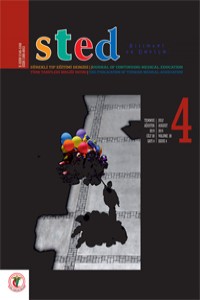Öz
Menopoz, kadınlarda,
üreme fonksiyonlarının sona ermesi ile başlayan bir dönemdir. Her kadının
hayatının belli bir döneminde deneyimlediği menopozda ruhsal, fiziksel ve
duygusal değişimler gözlenebilir. Menopoz sonrası östrojen salınımının azalması,
kadınları osteoporoz ve kardiyovasküler hastalıklar gibi bir takım sorunlarla
karşı karşıya bırakır. Engelli kadınlar, menarştan menopoza kadar, bulundukları
kadın hayatının dönemine göre bazı üreme sağlığı sorunları yaşar. Menopoz, engelli kadınların ihmal edilen üreme sağlığı
sorunlarından biridir. Menopozda görülen fiziksel ve duygusal değişiklikler,
kadın veya aile tarafından engelliliğin bir parçası ya da kullanılan ilaçların
yan etkisi olarak yorumlanabilir. Bu nedenle semptom yönetimi menopoza göre
yapılamayabilir. Engelli kadınların menopoz sorunlarına eşlik eden
engellerine ait sorunlarının da olması, grubu özel gereksinimi olan bir gruba
dönüştürmektedir. Ancak, engelli kadınlar tüm sağlık profesyonelleri gibi
hemşireler tarafından da yeterli hizmet alamamaktadır. Bu nedenle başta kadın
sağlığı hemşireleri olmak üzere tüm branşlardaki hemşireler, engelli kadınların
toplumun ayrılmaz bir parçası olduğunu kavramalı ve engellilerin sağlık
sorunları ile ilgili yeterli bilgiye sahip olmalıdır. Bu derleme, engelli
kadınlarda menopoz ve etkilerini sunmak amacıyla hazırlanmıştır.
Anahtar Kelimeler
Kaynakça
- 1. Taşkın L. Kadın Hayatının Devreleri. In: Taşkın L, editor. Doğum ve Kadın Sağlığı Hemşireliği. 13. Baskı. Ankara: Akademisyen tıp kitabevi; 2016. p. 683.
- 2. de Almeida EW, Greguol M. Healthcare for women with disabilities in the climacteric and menopause. Sex Disabil 2015;33(2):279–98.
- 3. Martin DM, Cassidy G, Ahmad F, Martin MS. Women with learning disabilities and the. J Learn Disabil 2001;5(2):121–32.
- 4. McCarthy M, Millard L. The menopause and women with learning disabilities. Found People with Learn Disabil Update 2002;3(14):1–4.
- 5. Welner SL, Simon JA, Welner B. Maximizing health in menopausal women with disabilities. Menopause 2002;9(3):208–19.
- 6. Morrow MH. The challenges of change: The midlife health needs of women with disabilities. Br Columbia Cent Excell Women’s Health 2000;64.
- 7. Walsh P, Heller T, Schupf N, van Schrojenstein Lantman-de Valk H. Healthy ageing - adults with ıntellectual disabilities women’s health and related issues. J Appl Res Intellect Disabil 2001;14(3):195–217.
- 8. Dormire S, Becker H, CJ L. Menopause healthcare for women with physical disabilities. Nurse Pract 2006;31(6):42–45.
- 9. Surviving the Change – Menopause and Women with Disabilities’ Available from: http://wwda.org.au/issues/health/health1995/menop1/ (05.07.2018)
- 10. Kalpakjian CZ, Quint EH, Tate DG, Roller S, Toussaint LL. Menopause characteristics of women with physical disabilities from poliomyelitis. Maturitas 2007;56:161–72.
- 11. Basson R. Sexual health of women with disabilities. Canadian Medical Association Journal 1998;159(4):359–62.
- 12. Becker H, Stuifbergen TM. Reproductive health care experiences of women with physical disabilities: a qualitative study. Arch Phys Med Rehabil 1997;78(12 Suppl 5):S26-33.
- 13. Bove R, Healy BC, Musallam A, Glanz BI, De Jager PL, Chitnis T. Exploration of changes in disability after menopause in a longitudinal multiple sclerosis cohort. Mult Scler 2016;22(7):935–43.
- 14. Chou Y-C, Jane Lu Z-Y, Pu C-Y. Menopause experiences and attitudes in women with intellectual disability and in their family carers. J Intellect Dev Disabil 2013;38(2):114–23.
- 15. Erel T, Güralp O. Epilepsy and menopause. Arch Gynecol Obstet 2011;284(3):749–55.
- 16. Abbasi F, Krumholz A, Kittner SJ, Langenberg P. Effects of menopause on seizures in women with epilepsy. Epilepsia 1999;40(2):205–10.
- 17. Willis DS, Wishart JG, Muir WJ. Menopausal experiences of women with ıntellectual disabilities. J Appl Res Intellect Disabil 2011;24(1995):74–85.
- 18. Seltzer GB, Schupf N, Wu H. A prospective study of menopause in women with Down ’ s syndrome. J Intellect Disabil Res 2001;45(I):1–7.
- 19. Coppus AM, Evenhuis HM, Verberne GJ, Visser FE, Eikelenboom P, van Gool WA, et al. Early age at menopause is associated with increased risk of dementia and mortality in women with Down syndrome. J Alzheimers Dis 2010;19(2):545–50.
- 20. Patel BN, Seltzer GB, Wu HS, Schupf N. Effect of menopause on cognitive performance in women with down syndrome. Neuroreport 2001;12(12):2659–62.
- 21. Kalpakjian CZ, Quint EH, Tate DG, Roller S, Toussaint LL. Menopause characteristics of women with physical disabilities from poliomyelitis. Maturitas 2007;56(2):161–72.
- 22. Kalpakjian CZ, Lequerica A. Quality of life and menopause in women with physical disabilities. J Women’s Heal 2006;15(9):1014–27.
- 23. Sudduth A, Linton D. Gynecologic care of women with disabilities: implications for nurses. Nurs women’s Heal 2011;15(2):138–48.
Ayrıntılar
| Birincil Dil | Türkçe |
|---|---|
| Konular | Sağlık Kurumları Yönetimi |
| Bölüm | Derleme |
| Yazarlar | |
| Yayımlanma Tarihi | 2 Ağustos 2019 |
| Yayımlandığı Sayı | Yıl 2019 Cilt: 28 Sayı: 4 |


